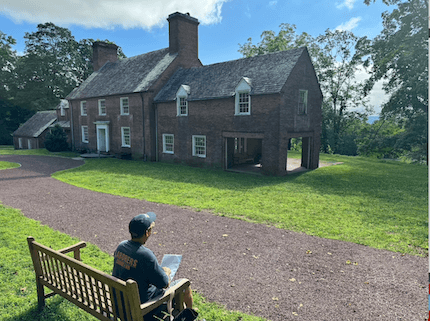A Nyack Millennial Describes the 5 Words That Were in Vogue in 2016
by Sam Schieren
“Words matter, my friends,” Hillary Clinton told a Des Moines, Iowa crowd on August 10th, 2016. “And if you are running to be president, or are president of the United States, words can have tremendous influence.” This after one of Donald Trump’s seemingly unforgettable yet oft forgotten unprecedenteds—suggesting “Second amendment people. . . . could do [something],” about Clinton’s potential Supreme Court choices.
For me, 2016 was a year in which words seemed more detached from their meanings than ever before in my lifetime. Vagueries erupted as social and political bombs, creating a national feeling that something must be done about something or else something terrible would befall someone, maybe even us. Who, what, when, and how seem to be left out of an equation that was full of answers for Why? (The Crooked Lying Cheating fill in the blank) and Where? (America, of course).
The following five words were at the front and center of the alarming 2016 American lexicon, and represent emotions, developments, and movements for which I believe this year will be remembered.
 Alexa
Alexa
Saying “Alexa”—the default activation phrase for Amazon’s most significant piece of hardware since the Kindle—awakens Amazon’s best-selling electronic device, the Echo. It readies the Echo to assist with your quandaries at your beck and call.
The proliferation of the high quality intelligent speaker tube signals a broad social transition towards the ‘smart home,’ a long surmised inevitability of human-tech cohabitation. The Echo device and its physically smaller child (Echo Dot), is at all times listening, recording audio from whatever environment in which they are placed, in constant communication with the Amazon Cloud via the cloud-based AI Alexa—a feature I imagine Edward Snowden finds deeply worrisome and the NSA, quite exciting. It is hard to ignore the shadowy Big Brother implications evinced by millions of Americans welcoming an always-listening smart device into their homes.
Akin to Apple’s Siri and Google’s “Okay Google,” the AI interacts with users only upon their issuing commands to the intelligent female-voiced device. And she too is quite helpful.
As we continue to broadcast an ever-greater percentage of our lives to be available for public consumption, as we continue to listen to more and more podcasts by less and less professional broadcasters, it is not hard to imagine Alexa adapting a feature, not unlike Facebook Live or the new Instagram Live, of a live feed audio channel. With these potentials existing and with our country in such an odd, unpredictable, and dystopic period of development, George Orwell’s words have never seemed more prescient:
There was of course no way of knowing whether you were being watched at any given moment. How often, or on what system, the Thought Police plugged in on any individual wire was guesswork. It was even conceivable that they watched everybody all the time. But at any rate they could plug in your wire whenever they wanted to. You had to live—did live, from habit that became instinct—in the assumption that every sound you made was overheard. . . .
Woke
As woke’s phonology suggests, the word refers to a state of ‘being awake.’ Awake to what? Social injustice, generally that which oppresses people of color, women, and other marginalized communities.
Used in a sentence: Bernie Sanders, long time Civil Rights advocate, once arrested for protesting in the 1960s Civil Rights demonstrations, is woke.
In 2008, the word entered the public vernacular on the success of Erykah Badu’s Master Teacher, in which she sings the refrain “I stay woke.” It was initially given as a badge of approval, bestowed upon White allies, typically men, who are ‘down for the cause’ or who ‘talk the talk, and walk the walk.’ Allies who not only support efforts to combat White male supremacy but acknowledge their privileged status in the system as a White male. “Think of ‘woke’ as the inverse of ‘politically correct.’ ?If ‘P.C.’?is a taunt from the right, then ‘woke’ is a back-pat from the left,” wrote NY Times Magazine contributor Amanda Hess back in April.

via Wikipedia
However, as with most things Millennials facilitate that achieve popularity on social media, the term is under attack by a corrosive irony and a watering down of meaning, if not a complete redefinition.
“‘Woke’ feels a little bit like Macklemore [a White rapper] rapping in one of his latest tracks about how his whiteness makes his rap music more acceptable to other white people. The conundrum is built in,” writes Hess.
This year, the term has shifted from a badge duly earned to an easily enacted performance; craft a few well-worded tweets, share an article by Ta-Nehisi Coates, and you’re woke. Further, the word has been turned into a trendy saying for almost any context, regardless of meaning. Online, among my Facebook friends and the general Twitter public, the term woke is used almost as punctuation, perhaps conflated with the versatility of other viral words like ‘lit’—which made my long list of words of the year.
The Cubs won the world series!! #staywoke Chicago
Hillary love that hot sauce lol #woke
So, like hypothetical Macklemore, I acknowledge my Whiteness and the potential inappropriateness and appropriation inherent to my defining the word—let alone bestowing it upon entities. Still, to the reader I say: Be aware of “woke”, it’s uses, abuses and implications; don’t pin the badge unless the recipient is really down for the cause; but nonetheless do your best to stay woke.
Aesthetic
Lastly, what is probably my favorite word of the list, Aesthetic—mostly because I don’t know what it really means. I took to the word so confidently yet, reflecting, I can’t give you a better off-the-cuff definition than its synonym, vibe. A Nyack friend of mine told me about a word her professor used and taught: thingliness. The word, too abstract to pull a real definition from, is, I think, another apt parallel to aesthetic. That is, they give off the same vibe.
But, I have the internet at my disposal now; the Merriam Webster definition that best suits the word’s 2016 usage is: A particular taste for or approach to what is pleasing to the senses and especially sight.
The word can be applied to almost anything. I like to think of the 2016 use of aesthetic as how anything or -one is decorated, how they present themselves, how they appear.
In citing it as a word of the year, I don’t mean to posit that the term is new in any way. Aesthetic has been the focus and curiosity of many major philosophical and scientific minds for millennia, dating back to Plato in the early 4th century B.C.
The reason aesthetic makes my list, similar to woke, is its rampant and devaluing usage amongst those of us in the millennial bubble. And, like conspiracy, I feel its unspoken usage made for its greatest influence on 2016 America. After all, what was the most common reason for not voting for Hillary: “I just don’t like her.” When the emails and Clinton Foundation were stripped away from the argument, which many of my friends were apt to allow in our casual debates, what was left was “I just don’t like her.” What was not liked? I would argue her aesthetic, or her failure to cultivate a pleasing one. (An aesthetic is not so different from a brand.)
“I don’t like their/the aesthetic,” is the easiest way for me to dismiss an artist, performer, album, etc. And it is for just this reason that I like using the term. It spares me the time and effort of elaboration. But for me, and this could be just me, the term has taken on a slightly corrupted function, one that goes beyond art criticism. It seems to be an easy entry point to judgment of individuals, a term that allows one to ‘judge a book by its cover.’ You see the way someone decorates their person(a)—their clothes, hair, jewelry, makeup, social media presence, friends, the way their friends do all the previous, etc.—and make a judgment of their value to you based on this limited heuristic data. Social preferences become ever more shallow.
Everyone has their own taste. But the 2000+ year old origin of aesthetic was meant to be an objective judgment and valuation of art, taste, and beauty—not individuals. The growing focus on public performance, the art of self presentation, that my generation has become so good at, encourages the application of aesthetic to be subjectively applied to almost any individual you meet. Everyday people doing everyday things become subjected to a constant judgment of their surface.
And it’s hard for younger people like myself, more prone to the influence of judgment, to keep up with both this and the expectation of being a deep genuine person. It’s like you have to choose between effective existence in two different worlds, one of appearance and one of, what? Reality? You can try juggling both; but it’s hard to do. Or you can merge the two, usually done ignoring one, for they both will exist.
Of course, these could be centuries-old problems that I’m just now realizing or just now coming to terms with—this required public performance. But regardless, I think it is bad for it to be increasingly required as my over-sharing generation shares more and more.
Is it an art to constantly manage your visual aesthetic? Is the art worthwhile? I, for one, feel that if you want your body, your appearance, your physical existence to be your art than you really ought to be dancing. Yes; everyone should dance.








